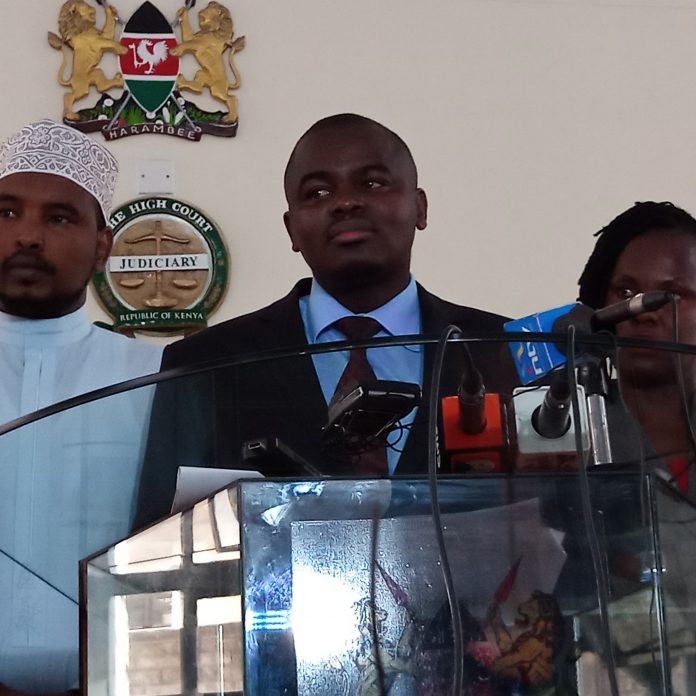
BY SAM ALFAN.
The Kenya Judges and Magistrates Association has protested decision by the National Council on the Administration of Justice(NCAJ) to reopen the courts countrywide saying the move exposes Judicial officers to Covid-19.
The association through Secretary General Derrick Kutto, he said members regrets that there was lack of consultation before the directions issued on Thurday by Chief Judtice David Maraga on behalf of NCAJ, especially at this time when the cases of coronavirus are rising exponentially.
“It is even more disturbing that our sister organization (LSK) seems to have big sway in the Council. We were alarmed that LSK shared the statement a day before. The LSK leadership has used its perceived influence to intimidate and “direct ” our members on what they think is proper”, says Kuto.
The judicial officers body said they appreciate NCAJ for scaling down matters when only one case had been confirmed in Kenya but are surprised that with the cases spiralling to disturbing levels, our members are being highly exposed by the scaling up of cases.
The SG says majority of the judicial staff and some Judicial Officers use public means of transport to get to work and there is likely to be a serious challenge of avoiding contact with people of unknown contact or travel history.
“A majority of our clients use public means of transport to get to work. At our place of work, the clients get into contact with the judicial staff. In turn, the judicial staff get into contact with Judges and Judicial Officers. This produces a snow-balling effect, just in case one of them is infected. Again, on this front, there is likely to be a serious challenge of avoiding contact with people of unknown contact or travel history”, he added.
Further, Kuto argue that the opening the courts and scaling up services shall be for all litigants and not only advocates and it will require litigants to move to and from courts all over the country and this will disrupt the Ministry of Health program requiring people to stay at home and it will eventually have a negative impact on the measures put in place to contain the virus.
He further said some of the members conduct their daily operations from tiny chambers and this will for sure present a challenge including but not limited to keeping the social distancing of at minimum one metre as required by law (The Public Heal [COVID-19 Restriction of Movement of Persons and Related Measures] Rules, 2020).
“Concerns have been raised that if one of our members or a judicial staff or a client is affected, it may lead to all those who came into contact to be quarantined at their own expense. This may obtain a causal sequence to members of our families, who may also be quarantined at our expense. Needless to say that media reports have shown those in quarantine raising serious concerns”, adds Kutto.
The association also request that the status quo now obtaining be maintained as the world looks for a solution to this deadly disease and suffice to say that the disease has no cure. For Kenya, there are many contacts being pursued and no one knows where and who they are. This calls for more caution.
He adds that MOH is yet to roll out the mass testing program. They are only testing those showing symptoms and those who have been exposed and the actual spread and extent of the virus cannot be ascertained.
“We have read and noted contents of the memo from the honourable CRJ. We will patiently allow the ministry of health to do an assessment of our court premises. We request that KMJA be involved in the exercise”, adds Kutto.
According to the internal memo seen by Nairobi Timez, the Judiciary chief registrar Ann Amandi she was directed by NCAJ and Judicial Service Commission to liaise with the Ministry of Health with a view of seeking advice on infection prevention and control measures to be observed in our courts, registries and waiting bays, before embarking on the proposed up scaling initiatives.
“The up scaling of court operations is contingent upon the Ministry of I-lealth providing guidelines for each individual court station. This is in recognition of the fact that our physical infrastructure differs from station to station and a uniform application of preventive guidelines would not be practical”, says Amandi.
KJMA said members have harnessed technology to do much in these defining times.
“We urge the judiciary to empower everyone to use ICT to do their work and members are ready and willing to be part of a solution. We acknowledge that no one anticipated this disease. With cases increasing daily, we have every reason to get worried,” adds Kuto.
The association expects response from National Council on the Administration of Justice(NCAJ).






